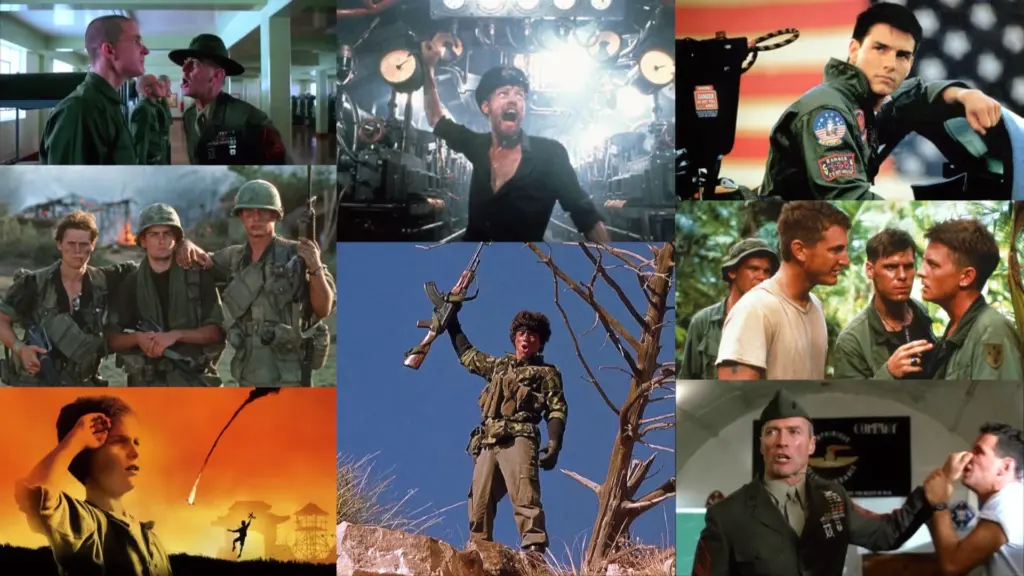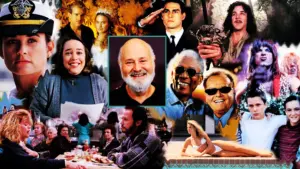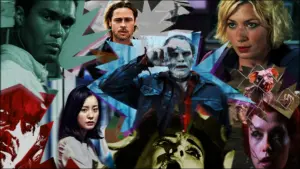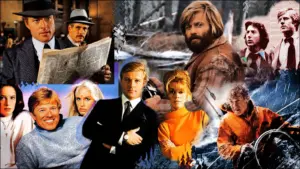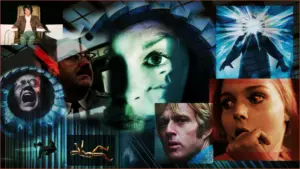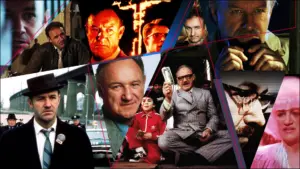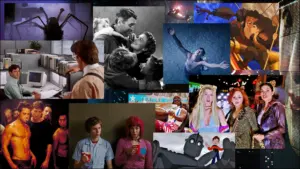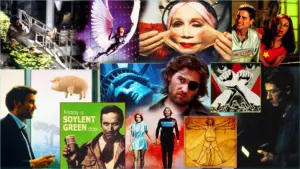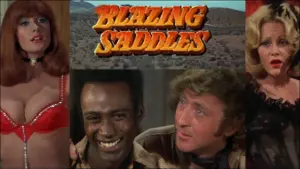After the malaise of the 1970s and sad end to the Vietnam war, the USA was ready for some happier times. Enter Ronald Reagan, a new USA president with a love of jellybeans and the military. Reagan and his policies were instrumental in the cultural shift of the 1980s that glorified the military and war. Consequently, there was surge of both pro and anti-war movies.
I came of age during this time, and like any red-blooded American boy, I watched all these movies and got caught up this cultural wave. I also had a passion for World War II history. Now when I look back on these movies, I do so with nostalgia, but with a more critical eye. With that in mind, let’s rank this body of work.
For this list, I picked out movies that were released in 1980-1989 and focused on the military or war. I did not include every war-adjacent story there was in the 1980s (as this list would be miles long.) For example, An Officer and a Gentleman is a definitively pro-military movie, but it is not about the military exclusively. I also am excluding the nuclear war genre, as that was a separate trend, with the likes of Threads and The Day After. Finally, as a United States citizen, this list will have a USA bias.
I included trailers or clips from YouTube for each movie. As always, I apologize in advance for the advertisements in these.
Special Mention – The Final Countdown (1980)
I wanted to begin with the movie that inspired this list. I love this movie and its classic time paradox premise: a modern aircraft carrier gets transported through time to December 7, 1941, right before the Japanese attack Pearl Harbor. Should they fight back and change history or let the Japanese win?
Yes, the acting is cheesy, the story dorky, the special effects weak (even by 1980 standards), and it borders on Navy propaganda at times. Nevertheless, like many other movies on this list, I find it extremely enjoyable.
15 – Heartbreak Ridge (1986)
In last place is a stupid movie that only gets on this list because it is so damn fun to watch. Ultra-wincey Clint Eastwood plays a gruff old Marine gunnery sergeant Highway, who yearns for the good ole days of killing foreigners. He takes over a squad of lazy, Semper Fi-curious goobers and naturally beats them into shape with his harsh, unconventional, old-breed sensibilities. The story is ludicrous, the acting cheesy, and the characters about as deep as a puddle. The subtle racism and homophobia are equally cringe, but fundamentally the movie has a good heart. While the movie may not earn any applause from Chesty Puller, it is difficult not to cheer when Eastwood and his raggedy-ass marines kick commie butt at the end.
I threw this in at the end, because the movie is such an obvious attempt to reframe the military as a positive force in people’s lives (well, except for those guys they kill). Many of the movies on this list had a huge cultural impact, particularly Platoon. They made people question Reagan’s pro-military attitudes. Heartbreak Ridge was an attempt to recapture Reagan’s positivity. For better or worse, it works mainly due to Eastwood’s iconic performance.
14 – Hamburger Hill (1987)
Hamburger Hill was late to the ’80s war movie game. The movie is a by-the-book war movie with competent direction, performances, and cinematography. What sets this movie apart from all the other Vietnam movies of the era, is that it is largely apolitical. It does not make some grand message about the war, either pro or anti. Rather, it simply tells the story of a single fighting group and their bloody battle for something largely worthless.
13 – Big Red One (1980)
The Big Red One is an interesting movie. It was not very successful when it came out. The main draw was Mark Hamil, fresh off his success with Star Wars, and Lee Marvin. However, there is a lot to like about this movie. One of the most interesting things is how it sets up a lot tropes we see repeated in subsequent war movies.
On the surface, the movie is a by-the-book tale of an infantry unit as they battle their way across Africa, Italy, France, and finally Germany. The Director Samuel Fuller had originally shot a three-hour movie based on his own experiences in the Big Red One infantry unit in WWII. However, the studio butchered it down to a leaner 2 hour run time. This creates some inconsistent pacing and tone, but overall, the movie works.
The real gem of the movie is Marvin, who plays the tough as nails sarge who is always protecting his men. Many reviews criticize Marvin’s cold delivery. I think this was intentional. Marvin’s character is numb from all the horror he has endured. His coldness is how he copes. This is a trope a lot of war movies now use.
Another trope this movie created was the “why we fight” sequence. Near the end of the movie, the squad helps liberate a concentration camp. The men finally understand what their sacrifice really meant.
While the movie is good, maybe not great, there are a lot of big red firsts in this movie that are worth noting.
12 – Born on the Fourth of July (1989)
Oliver Stone returns to Vietnam, but this time leans into his anti-war message. Rather than focus on the actual combat, which occupies a short sequence in the beginning, we follow a disabled veteran, Ron Kovic (Tom Cruise) cope with the aftermath. Kovic must rehabilitate not only his body, but his mind, coming to accept that the cause in Vietnam was not all it was sold to be.
Stone was on a roll in the 1980s (he directed Talk Radio and Wall Street between this movie and Platoon.) This movie introduced America to Post-Traumatic Stress Syndrome (PTSD), which had only just entered the cultural vocabulary. It also flipped the script on the right-wing propaganda of the time, and showed that you can love your country, but not love everything it does.
Cruse’s performance absolutely shines in this movie. Admittedly, it does not have quite the visceral punch of Platoon, or the morality lessons of Casualties of War, but it is still a powerful anti-war movie that helped America come to terms with the disaster in Vietnam.
11 – Taps (1981)
This movie was a bit of stretch for this list, because it is about a military school, and not necessarily the military. However, it is such a good movie, with some superstar actors early in their career, I had to throw it in. The boys of a fictional military school are given notice that their school will be closed. This sets in motion an ill-fated, armed insurrection to occupy the school and demand reconsideration. There is a lot to love about this movie, from its terrific performances, moody cinematography, to the snare drum tight directing and pacing.
However, what stuck with me was the morality story about how discipline and honor can corrupt men without morals. In the beginning of the movie, you sympathize with the characters and their dedication to their leader and school. They want to protect something that gives them meaning and purpose. The conflict is clearly set between the honorable boys and the heartless outsiders. Then slowly over the course of the smoothly paced 2 hours, this façade crumbles to reveal the real conflict between reason and fanaticism among the boys. This movie foreshadowed what is happening to a lot of young men today: being “red pilled” into fetishizing guns, power, and fascism.
Director Harold Becker had a career high with Taps as the rest of his filmography is unremarkable. This is unfortunate since Taps was well-directed and clearly showed he had skill.
10 – Red Dawn (1984)
The quintessential Reagan-era movie. God-fearin’, clean-livin’, country football guys are gawking at chicks in high school when the skies fill with them evil Russkis. Thanks to their charming, good looks, rugged American exceptionalism, and unlimited bootstrappiness, they take to the hills and show them godless commies what it means to be a real ‘Murrican. YEE HAW!
Seriously, this is an insipidly stupid movie, but like Top Gun, it is tremendously enjoyable to watch. Red Dawn also takes you back to a simpler time when the Russians were the bad guys … oh wait, they are still the bad guys. A more wholesome time when the president was a dottering old man … uhhhh.
Anyway, it is fun to watch. WOLVERINES!
9 – Come and See (1985)
This movie is often at the top of war movie rankings. There is a good reason for that. It is a brutal and bleak depiction of the Nazi invasion of the Soviet Union in 1943. It centers around a young boy, fighting to survive among inhumane conditions. The gritty, Soviet filmmaking style only heightens the realism.
I knocked this movie down the list a bit because it is so difficult to watch. You do not watch this movie, you endure it. Its authenticity is exhausting. Also, this movie got almost no attention or distribution until after the fall of the Soviet Union in the 1990s. Most people, myself included, did not see this movie until it emerged on video in the early 2000s. Nevertheless, it is a great movie, if not a depressing one.
8 – Top Gun (1986)
When I saw this movie, at the ripe age of 16, I thought it was the coolest thing ever. I wanted to fly fighter jets so bad (and have those greasy, ripped abs). Which is exactly why this movie was produced. Tom Cruse at his cockiest, Val Kilmer at his most menacing, and heart-pounding arial combat scenes made this wildly entertaining movie. Yeah, the plot is hokey, the acting cheesy as heck, there are zillions of glaring factual errors, and the story is essentially pro-war propaganda, but it is a heck of a ride.
Watching Top Gun now is like going back in time to a carefree, 1980s summer of cheap fast food, playing Atari, lining up to see Star Wars the Empire Strikes Back, and the Gipper on TV telling us its Morning in America. This movie and Cruise’s performance perfectly captured that 1980s cocky, can-do mood. It is equally impressive that Top Gun’s sequel (30 years later) managed to recreate some of this same cheerfulness.
7 – Casualties of War
I remember when this movie came out, it felt like a Platoon knock off. It tells a similar tale of a youthful recruit who has his innocence shredded in the immoral pit of hell that is Vietnam. Where this movie sets itself apart is the artistic direction from Brian DePalma. DePalma sets aside all the explosions and intensity, to focus on a single, horrific incident (the casual raping of a Vietnamese woman) and the soldier who holds on to his humanity. Michael J. Fox and Sean Penn were odd choices for the leads. They were both at the zenith of their career, with vastly different styles. However, DePalma’s gamble works, as Fox’s “aw shucks” personality and Penn’s method acting style clash perfectly.
6 – The Killing Fields (1984)
As the USA was trying to reframe attitudes toward the Vietnam war, the Cambodian Genocide (which occurred in the years after the Vietnam war) tended to get swept aside. This all changed with the Killing Fields, which told the true story of journalist Sydney Schanberg (Sam Waterston) and translator Dith Pran (Haing Ngor). This movie shines due to the authentic and nuanced performance of Ngor. Ngor takes you on his horrifying journey with wide open eyes. Director Roland Joffe hit a career high with this movie, which he never recaptured.
5 – Empire of the Sun (1987)
Many war movies like to explore how war kills innocence. Empire of the Sun inverts that trope, and shows how innocence can triumph. A young Christian Bale plays Jim, a boy from a well-to-do English family who gets caught up in the Japanese invasion of China in the late 1930s. Jim gets sent to a Japanese prison of war camp, where he must learn how to forge friendships and hustle resources to stay alive. There is much to love about this movie, from the stellar cast, brilliant acting, to the stunning cinematography. However, I think what resonated with me was how Jim is so enthralled with the planes, regardless of who flies them. As a dorky kid who also liked fighter planes, I related to this. The movie is not horrific for shock value or overly sappy. Quite the contrary, it tells a very human story that is devoid of such ham-fisted attempts at emotional manipulation.
This was one of Spielberg’s earlier movies, and he was still learning the craft. However, his masterful storytelling abilities are on full display even this early in his career.
4 – Platoon (1986)
While the Deer Hunter (1978) opened the door to re-examining the pit of horror that was Vietnam, Platoon swung the door all the way and shoved us in. Like many war movies, we are dropped into world of young, idealistic private Taylor (Charlie Sheen). Taylor gets thrown right into the lunacy and quickly his visions of honor and duty are burned alive. Stand out performances from Tom Berenger, Willem DaFoe, and Kevin Dillion only improve upon Oliver Stone’s story. I remember watching Platoon in the theater, and it completely changed my perspective on the Vietnam war (from indifferent, to horrified). Platoon was the antithesis of Reagan-era jingoism and it had a lasting impact on not only war movies, but military policy as well.
What puts this movie near the top is Stone’s empathetic direction and the massive impact this movie had on the culture. Stone served in Vietnam, and he breathes an authenticity into the movie that few directors could ever hope to achieve.
3 – Gallipoli (1981)
World War I does not get a lot of attention in movies (until recently), and the contribution of Australia and New Zealand (ANZAC) to the effort gets even less. Peter Weir’s tale of two buddies Frank (Mel Gibson) and Archy (Mike Lee) running off to war, with such youthful exuberance, only to be cut down in the Dardanelles (in what is now Turkey) is heart wrenching.
Watching Gallipoli is a journey from supreme happiness to crushing loss. When characters die, you feel their loss as if they were close friends. This is one of the strongest anti-war movies of the ’80s. Gibson and Lee are at the peak of their careers, with unlimited charm and handsome good looks. You instantly bond with their carefree, earnest, and idealistic enthusiasm. It also was America’s introduction to a brilliant filmmaker, Peter Weir who would go on to make a series of awesome movies in the 1980s and 1990s such as The Year of Living Dangerously, Dead Poet’s Society, and Witness.
2 – Full Metal Jacket (1987)
This is my rifle, this is my gun! After the dour, gut-wrenching horror of Platoon, legendary filmmaker Stanley Kubrick hit movie theaters with a jet-black satire of war that is difficult to fully describe without excessive use of adjectives. The first half is a bonkers tour of Marine Corps boot camp with Private Joker (Mathew Modine). During this half, we are treated to the breathtakingly spot-on performance from real drill instructor R. Lee Ermey. Ermey’s performance is so earnest, hilarious, and memorable, it not only steals the entire movie, but it also sets the gold standard for drill instructors in all war movies, forever. However, Ermey’s performance is equally matched with the creepy intensity of Private Pyle (Vincent D’Onofrio in a career-defining role). The back-half of the movie is less engaging; however Ermey and D’Onofrio’s jaw-droppingly good performances in the first half, render this complaint largely immaterial.
1 – Das Boot (1982)
Harrowing and claustrophobic do not even begin to define this movie. Das Boot is a German film about the terror of submarine warfare in World War II. We follow the skipper and crew of the Nazi sub U-96 as it sinks allied transports, gets depth charged, and almost implodes more than a few times. The movie is tense, intense, and immensely anxiety inducing. Brilliant acting, a glorious soundtrack, historically perfect set design, and atmospheric cinematography round out the praise. The ending is a sublimely perfect gut punch.
What puts this movie in the top position is how well it has held up over time. Das Boot never preaches at you. It has no long-winded speeches about honor and duty. Rather, it drops you into the sub, and shows you in clear, unambiguous terms, the pure terrifying hell these men endured. The fact that it is about a Nazi submarine makes the message of hopelessness that much more powerful. You want to demonize these men, but they are just caught up in the banal machinery of evil. In the end, you do not hate them, you feel unending sorrow for them.
Honorable Mentions
- Iron Eagle: Ultra-cheesy Top Gun knock-off, but Louis Gosset Jr. shines.
- Glory: Supremely entertaining Civil War flick, marred with Mathew Brodrick in the starring role.
- Uncommon Valor: A solid Gene Hackman rescue flick, marred with uneven acting and pacing.
- Good Morning Vietnam: This is an example of a war-adjacent movie, so it did not fit this list. However, it is a fantastic movie, with Robin Williams at the peak of his career.
- The Year of Living Dangerously: This is another war-adjacent movie, with absolutely sizzling performances from Mel Gibson, Sigourney Weaver, and Linda Hunt. Peter Weir was in top form in a movie that is tense, heartbreaking, and glorious all at the same time.
- Bat 21. An engaging Vietnam rescue movie, where legendary actor Gene Hackman gets upstaged by … Jerry Reed. Seriously?

